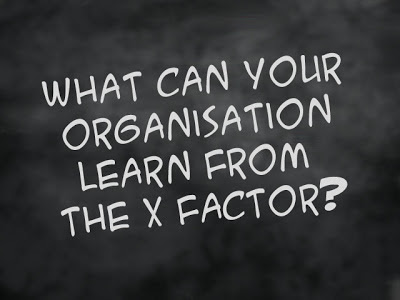The X factor
 My 10 year old daughter was not impressed. For the third week running the judges on the hit ITV show X-Factor had reached 'deadlock', where the four person panel had a split vote on which of the contestents would go out of the competition that week. Instead, under the rules of the competition, the fate of the apparently equally awful contestants would be decided by referring back to the public telephone vote.
My 10 year old daughter was not impressed. For the third week running the judges on the hit ITV show X-Factor had reached 'deadlock', where the four person panel had a split vote on which of the contestents would go out of the competition that week. Instead, under the rules of the competition, the fate of the apparently equally awful contestants would be decided by referring back to the public telephone vote.Now, I'm not a massive fan of the X-factor, or of reality style TV shows on the whole to be honest, and there is always a side of me that sides with the sceptics who say that nothing happens by chance in television, but for me there was something about this situation that raised my interest.
Let's assume, for the moment at least, that the situation that the judging panel found itself in was not contrived. How come they had once again got themselves into a situation where the decision did not rest with them, but with some outside 'higher agency' (ie the public)?
It's about decision avoidance. If I know that one way to avoid personal stress is by not exposing myself to getting it wrong, then defering decisions to other people gives me a neat way of reducing my own anxiety. By colluding, consciously or otherwise, with my colleagues I can create exactly the situation where my stress levels are minimised and where I cannot be blamed for any error arising from the decision they have made and which I have wriggled out of. By putting the decision back to the public vote (try to hold on to the non-contrived view if you can), the panel relieve themselves of any responsibility associated with the outcome.
And that's a bad thing.
And the even worse news is that government and public sector bodies are masters of this.
In an earlier blog post (Crowdsourcing for Dukes) I talked about the decision avoidance pitfalls asociated with crowdsourcing, where external groups input to company strategy. It worries me when executives in organisations, or judges on popular TV programmes, choose to defer their decision making responsibilities onto third parties. This is nothing less than a cop out from their obligations and defers what might be a vital decision to a group of stakeholders who might not have the best interests of the outcome at heart. That is one thing when it is a judge on a TV show, but completely different if the situation were to apply to a decision process made by (say) the Directors of a company. As someone whose prime role is to act in the best interests of the organisation at all times, in accordance with the fiduciary responsibility that goes with being a Director, the deference of such decisions abuses that responsibility. Consequently the health and future of the organisation is at risk.
A common paralysis seems to stike people and organisations around decision making. As Bertrand Russell once apparently said: "Dread of disaster makes everybody act in the very way that increases the disaster". That is the danger of decision avoidance. The negative impact of it can be seen in the reaction of the wider audience to the situation it creates. The bitter feelings aimed at the X factor judges and producers by my 10 year old are just an example of this reaction.
Decision avoidance might not be something we do consciously, but our basic preferences and values can allow us to justify doing it - it's a psychological defence that helps us to exist in an anxiety producing world. Decision making must be at an appropriate level within organisations and handled in such a way that decision avoidance possibilities are minimised and guarded against. As the Betrand Russell quote above suggests, good decision making supports organisational resilience whilst decision avoidance erodes this crucial trait. Stepping into your power as a leader, manager or judge on a popular TV show is about accepting responsibility for your decisions.
Erode that power at your peril.




Comments
Post a Comment